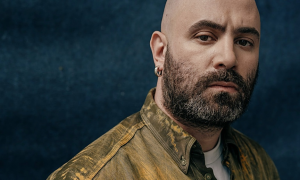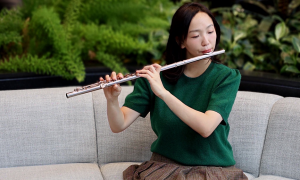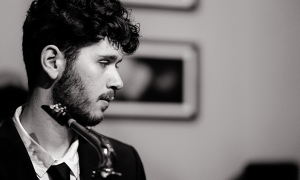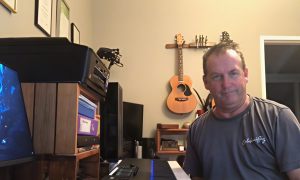Home » Jazz Articles » Take Five With... » Take Five with Tamar Sagiv
Take Five with Tamar Sagiv
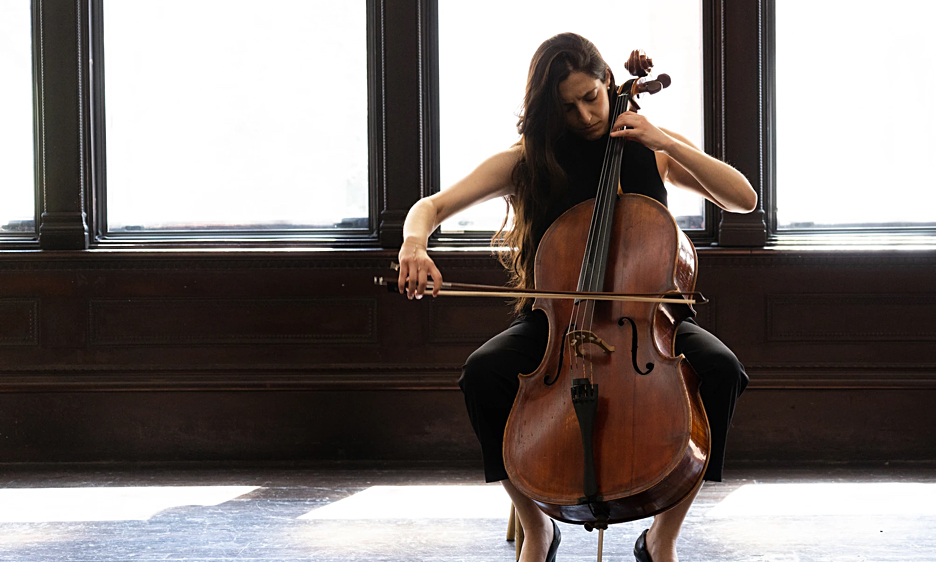
Meet Tamar Sagiv
On May 9th, 2022, Tamar played her debut concert in Carnegie Hall. She started her cello studies at the age of 8 with her teacher Uri Chen in the Kfar Blum Music Center, a small village in the northern part of Israel At 14, she moved to Jerusalem to study at the Israeli Arts and Science Academy with Professor Hillel Zori. At 15 she played as a soloist with the Kibbutz Youth Orchestra on their tour of Germany and played as a soloist with the Kibbutz Chamber Orchestra under conductor Yaron Gotfrid. Tamar has participated in master classes with Steven Isserlis, Ralph Kirshbaum, Gary Hoffman, Frans Helmerson and has attended festivals in Israel, Europe and the US. She has performed concerts in Carnegie Hall, Lincoln Center, Alice Tully Hall and the NYPL in NYC and recorded broadcasts for Israeli National Radio.In 2014 she won the 3rd prize and an honorary mention at the Buchmann Mehta school of Music Chamber Music Competition. Tamar has received scholarships from the AICF and the Ronen Foundation. She has also received a certificate of honor from Maestro Zubin Mehta and The Buchmann Mehta School of Music for outstanding achievements in the orchestra training program, in cooperation with the Israeli Philharmonic Orchestra. Tamar studied her Bachelor's Degree at the Buchmann Mehta school of Music in Tel Aviv University with Chagit Glaser and Felix Nemirovsky. She graduated from the Mannes School of Music in NYC with a Master's Degree and is currently studying in the PDPL program at Mannes, with Professor Matt Haimovitz.
Instrument:
CelloTeachers and/or influences?
All of my teachers had a big role in my life, each one in a different way.They really all taught me a lot and I feel lucky that I was fortunate enough to have the opportunity to study with them and incorporate their musicality in my playing.
I would mention two of them in particular: My very first cello teacher, Uri Chen, had the most influence on me as he was the one who made me love music and fall in love with the cello.
I have been studying for the past 4 years with my teacher and mentor, cellist Matt Haimovitz.
Matt has been a huge influence on me and my musical journey. His ideas and thoughts about music today helped take my career to a completely different direction than what I had thought or expected.
For the past few years I haven't been teaching, but for many years I used to teach and I know that this is one of the hardest things to do as a teacher—make the student love classical music. At the end of the day I think this is the most important role that music teachers have.
I knew I wanted to be a musician when...
The first time I heard Jacqueline Du Pre playing the Elgar cello concerto. I was 12 years old and even though I saw her video on YouTube I could feel that she played it with so much charisma and beauty that she made me fall in love with the music and the cello.Today I have a greater appreciation for that moment because I know, as a professional musician myself, how difficult it is to transfer those effects through a video and not a live performance.
I think that it was the first time I could really understand how much power music can have on people and how influential it is. That was a big moment for me. Soon after, I became obsessed with her, my mother bought me all of her recordings and I listened to it non-stop.
A few years later, when I was 15 years old, I was fortunate enough to see a concert of cellist Mischa Maisky. From the moment he started playing, his first note caught me, I could feel the electricity in the air. It was another big moment for me, I was sure that music was my path and my life.
Today whenever I go on stage, I think about this moment, and hope the audience will feel the same way that I felt that night seeing Maisky.
Your sound and approach to music.
I always loved the sound of cellist Truls Mork, he has a big and expressive quality in his playing that I always admired. His sound was something I always aspired to and I would listen to his recordings over and over again.However, for the past few years I have distanced myself from his recordings because I have been trying to find a sound that is more unique to me.
For the past year I've been listening to a lot of jazz. Jazz players have a very different sound than classical players and it is fascinating for me to listen to it and be inspired by it.
A year ago I was working on the Debussy Cello Sonata for a concert in New York, and I remember thinking that if I could play Debussy like Ella Fitzgerald sings "Misty," then that would be really special.
Your teaching approach
Before I start working on anything related to cello I first want to know if the student likes music and if so, which kind.I think that working towards playing a piece or a song that the student really loves can make a real difference in how the student approaches the instrument and to practice in general.
It was clear to me when I worked with children who didn't want to listen to classical music and seemed to not really connect to it yet, that we need to find at least one song that they like and make it a mutual goal.
Other than that, I'm a big believer in short technique exercises. They are simple and don't take a lot of time, they really do make a big difference if you are consistent and incorporate it every time you practice.
Your dream band
For the past few months I've been working on writing a cello concerto. I have never composed music for other instruments, I usually compose only for myself, which makes it such an interesting and difficult task.The reason why I wanted to write the concerto was that I imagined a very specific sound and the only way to get to it is by creating a chamber string orchestra and a big band ensemble that will be served as the orchestra for the concerto.
I really love the old recordings of Duke Ellington and his band. I imagine a very warm and smooth sound that the brass section will create—on top of that a melodic line of the cello. In my head it sounds beautiful and I hope that one day I will get to hear it live.
Road story: Your best or worst experience
I always have a good story to tell but the most recent one happened on a cruise ship.I went on tour to Europe with my pianist and we were asked to play a concert on a cruise ship. Obviously we immediately said yes without considering the fact that I had never been on a ship or at sea before.
When we arrived the ship was still docking and while doing the preparations for the concert in the evening it never crossed my mind that at a certain point the ship would start sailing, but in fact in the middle of our concert.
So we went up on stage and started playing, everything went well until I started feeling a bit dizzy. At that point I didn't know that I was actually sea sick because, of course, I had never been seasick before, but when the ship started rocking back and forth on the waves my chair and music stand started rocking with it. The good thing was that because I was so concerned I would fall from my chair or that the music stand would fall on my cello, I never got the chance to realize how seasick I was.
This experience taught me that until you play a concert where there is no solid ground underneath you, you don't know what having full control of your instrument is.
Favorite venue
My favorite venue as a cello musician is a place where people come together to appreciate beautiful music. While I am proud to have achieved my solo debut at Carnegie Hall, a venue with a rich history and prestige, I find my true passion in the energy and atmosphere created by the audience. I always find inspiration in the atmosphere and energy the audience creates—especially when I play free improvisation, that's where I really believe that my music is created together with my audience.Your favorite recording in your discography and why?
It's difficult to say because I'm a very tough critic and on every recording of myself that I listen to, I hear all the 'mistakes' and 'problems.'I think that I really came to peace with the recordings where I improvised. In my opinion free improvisation was never meant to be perfect, its purpose is to reflect on who you are and what you are at the moment you created it, and learning to accept it as it is, is a big thing.
Today when I hear classical music recordings that are just so perfect, it can really impress me and it can be incredibly satisfying. However, when I hear recordings that may not be technically flawless, but have a high level of energy and excitement, it can actually enhance my satisfaction and enjoyment even more.
What do you think is the most important thing you are contributing musically?
A bit more than a year ago I asked myself this question. I was wondering that because I believe that in order to be good at what you do and to stay relevant in the music industry, you always have to reinvent yourself and break rules. Especially in classical music, where there are a lot of rules that can be broken.When I started composing and free-improvising I did that purely for myself. It was a way for me to journal just without words. That was the most profound way I could express myself.
Only those who listen to my music can judge my contribution to the music world and how I affect them. As for me, having the ability to reveal my vulnerability and openness to my audience is a rare and frightening experience.
Did you know...
That I hate coffee. Yes, I tried all kinds and I tried it in many different countries but still, I can't drink it! It makes it hard because many of my meetings are over coffee and it's difficult and awkward to explain that I actually don't drink it.
So every time I meet people for a coffee. I order something else and I see that they are confused because we said we would sit down for a cup of coffee.
It is not that important but always provides me with some awkward moments.
The first jazz album I bought was:
Thanks to Spotify I didn't buy it, but the first jazz song I listened to that really caught my ear and made me want to listen to more jazz music was Blossom Dearie "They Say it's Spring." She is such a unique artist.Music you are listening to now:
Blossom Dearie: Once Upon a Summertime(Verve Records)Frank Sinatra: Moonlight Sinatra (Reprise Records)
Duke Ellington: Masterpieces by Ellington (Columbia Label)
Truls Mork: Rachmaninov/Miaskovsky: Cello Sonatas (EMI Records)
Desert Island picks:
Rachmaninoff: Rachmaninoff plays Rachmaninoff: The Ampico Piano Recordings (Decca Music Group Limited)Duke Ellington & John Coltrane: The Chopin Collection (RCA)
Frank Sinatra: Where Are You? (Capitol)
What are some of the essential requirements to keep jazz alive and growing?
Making live performances accessible. I think that many times tickets can be pricey to a point that most people cannot afford to attend a live concert.I feel that music is much more accessible than it used to be thanks to the growth of social media and streaming platforms such as Spotify and Apple Music.There is a huge amount of variety and it's amazing that you can reach people around the world so easily. But we all know that it can never replace live performances, and live performances are crucial for artists to exist and keep creating as it is still the main source of our income. I think that we are living in a bit of a weird time, where our music industry tries to fit itself to the current needs of the people and it is important that we will not fight this transition, but accept it and think how we can do better for ourselves and for our audience.
What is in the near future?
I have just released a new single of a solo free-improvisation I played late at night in the studio with my dear friend and recording engineer Hrushabh T.This recording is special for me as it is the first time I allowed myself to improvise alone—no pianists or electronics. Just solo cello.
I'm preparing for a few important concerts, including the highlight of them all—my graduation recital. I never got to do my Masters Degree Graduation because of Covid, and this concert will be a summary of my 4 years of studying and living in NYC. I want my recital to represent all sides of me—The Rachmaninov and Brahms cello sonatas that I love so much and my new loves which are free improvisation and some of my own pieces.
Four years ago, when I had just arrived to NYC, I never thought I would be composing my own music or improvising, and now that it has become such a big part of my life I don't know why I never did that before.
What is your greatest fear when you perform?
That I will forget the music!But in my nightmares (I have those before very important concerts), I get to the concert hall and find out when walking on stage that I forgot my cello at home.
What song would you like played at your funeral?
It would probably change and I don't like to commit but today my answer is the second movement of the Schumann cello concerto, it is just such a beautiful way to celebrate music and cello.What is your favorite song to whistle or sing in the shower?
"Strangers in the Night."If I weren't a jazz musician, I would be a:
Although sometimes I wish I could have done something different (it is a very difficult profession) I can't imagine doing anything else. I believe that the profession kind of chooses me.If I could have dinner with anyone from history, who would it be and why?
Definitely Blossom Dearie. I don't have a specific reason why I want to have dinner with her, but my wish would be to just sit with her, talk to her about her thoughts, inspirations and ideas. listening to her favorite music and hearing her stories. It would be great also if we had a nice Fazioli close by and could play something together!What is the piece you found most beautiful yet most complicated to play?
The Poulenc Sonata for Cello and Piano. The more I worked on it the more I realized how genius and beautiful it is and I think it's one of the best pieces written for cello and piano. Unfortunately, it is also one of the most (if not the most) difficult and awkward pieces to play in the cello and piano repertoire. So many awkward jumps. You really have to know your instrument and keep cool on stage.Tags
Take Five With...
Tamar Sagiv
AAJ Staff
Blossom Dearie
frank sinatra
duke ellington
John Coltrane: Duke Ellington & John Coltrane (Impulse! Records)
Frederic Chopin, Arthur Rubinstein
Frederic Chopin, Arthur Rubinstein
PREVIOUS / NEXT
Support All About Jazz
 All About Jazz has been a pillar of jazz since 1995, championing it as an art form and, more importantly, supporting the musicians who make it. Our enduring commitment has made "AAJ" one of the most culturally important websites of its kind, read by hundreds of thousands of fans, musicians and industry figures every month.
All About Jazz has been a pillar of jazz since 1995, championing it as an art form and, more importantly, supporting the musicians who make it. Our enduring commitment has made "AAJ" one of the most culturally important websites of its kind, read by hundreds of thousands of fans, musicians and industry figures every month.










